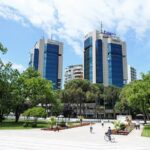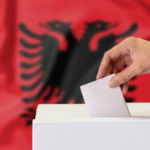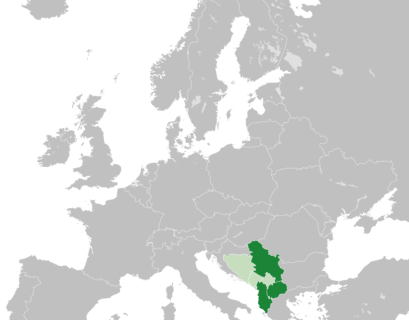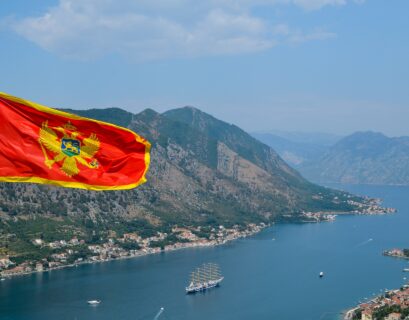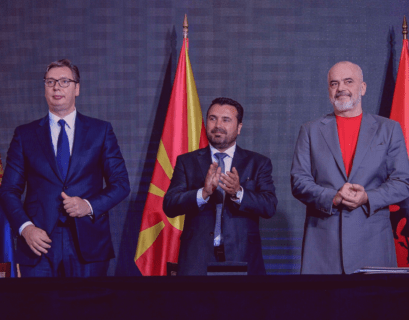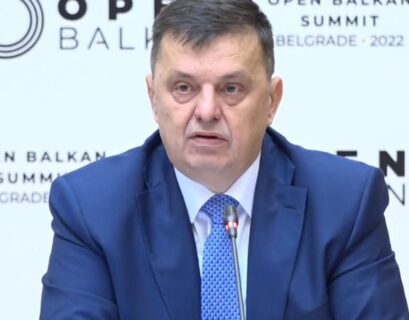By: Alexandra Voudouri
Introduction
In November 2021, at the Conference on: “Albania-Greece relations: shaping the future outlook”, the Albanian Institute for International Studies (AIIS) supported by Hanns-Seidel-Stiftung presented in Tirana the findings of an opinion poll entitled: “Albanian-Greek relations: Perceptions and Realities.”
The survey was conducted in Albania; thus, the findings refer only to the perceptions Albanian citizens have of their Greek neighbours, the bilateral relations and the many other social, political, and economic dimensions of Greek – Albanian relations.
The findings of the opinion poll show that the gap between perception and reality on Albanian – Greek relations remains unchanged, even though “normality” is the main feature of bilateral relations. It also seems that Albanian citizens have also not changed their views on what issues they consider as the main problems of bilateral nature. These are mostly related to politics and, mainly, on foreign policy issues.
Similar results are traced in the opinion poll conducted in Greece by the Hellenic Foundation for European and Foreign Policy (ELIAMEP, December 2020) about the perceptions of Greek citizens for Greek – Albanian relations. Nevertheless, Greeks tend to prioritize some of these issues differently[1].
The main findings of the survey conducted by AIIS showed that “the maritime border dispute” and “the Cham issue” are influential factors in bilateral relations. Regarding the latter, most Albanians believe that it hinders the improvement of bilateral relations. Additionally, 60% think referring the maritime border dispute to The Hague was a right decision.
Respectively, in the key findings of the poll conducted by ELIAMEP, a 12,5% of Greek respondents believe that the “the Albanian expansionism – ‘Greater Albania’” issue hinders the improvement of bilateral relations, while 12% believe that it is “Albania’s attitudes towards the Greek minority” and an 8% “the northern Epirus issue”. Only 1,5% assess that the issue of the maritime is affecting bilateral relations and 2.5 % of the public considers “the Cham issue” a problem for Greek – Albanian relations.
Comparing results of opinion polls on Albanians and Greeks’ perceptions about each other throughout the years, it is worth mentioning that citizens in both countries share common positive views on cooperation among the two peoples.
Albania’s Prime Minister Edi Rama recently explained the above phenomenon, when publicly admitting in his interview with Greek daily, Ta Nea, on November 6, that “politics in both sides has failed to follow in the steps of people, who have good relations. Albanians in Greece are integrated, they speak with their work and respect for the country. The same here, Greeks living here as citizens are in their own home. Politics has failed to bring relations between the two countries to the same level.”
Mr Rama’s claim perfectly sums up the reasons why citizens in both countries evaluate more positively their personal relations than state affairs. However, it leaves out the role of the media.
The media in both countries go hand in hand with politics. It is needless to say that the media play a powerful role in shaping public opinion; thus, it is necessary to explore how and to what extent citizens’ perceptions are shaped by news.
A general observation is that Albanian media tend to focus more on Greece, whereas Greek media mainly focus on Albania when there is a story related to foreign policy, or the Greek minority and Turkish – Albanian relations. Principally, Greek media tend to cover Albania more through a political rather than a social lens.
The landscape of Greek media
The Greek media landscape is currently oriented by online fragmentation, a polarised TV market, a print sector in crisis and one of the highest uses of social media as a news source. Trust in mainstream media remains one of the lowest in all relevant surveys. Pluralism could only be traced online, while criticism of government policies is restricted mainly in social media and news websites. This limited pluralism is becoming more evident on issues related to foreign policy and mainly on “national issues”. Following a trend characteristic of almost all governments in Greece, the current New Democracy administration is setting the agenda, the “official line” on almost all issues. The lack of specialized knowledge on issues related to foreign policy is making it harder for the Greek public to form independent views[2].
What is reported on Greek – Albanian relations?
The following limited study will focus on news and reports related to Greek – Albanian relations, following the July 2019 elections, which brought the ND party in power.
Looking back at the relevant material of the last 2.5 years there have been numerous cases that show how the media approach Greek – Albanian relations and influence the public’s perceptions for the neighbouring country.
The selected time July 2019 – November 2021 was very interesting for the bilateral relations, since the two governments agreed to refer the dispute over maritime borders in the Ionian Sea to the International Court of Justice, in October 2020. Additionally, there were several visits of Albanian Prime Minister, Edi Rama, to Greece (October 2019, September 2020) and yet another meeting with his counterpart, Kyriakos Mitsotakis, in Brussels (June 2021), while Greek Foreign Minister, Nikos Dendias, visited Albania twice, immediately after the earthquake (November 2019) and again in an official visit (October 2020). Moreover, Albania’s European perspectives were warmly supported by Greece at numerous General Affairs Councils and through several related initiatives taken by Greek diplomacy.
The study will also make short references on how Albanian media approached the same stories. However, since the source of these are just translated reports in Greek, it is uncertain whether the analysis of the connotations of these reports is completely accurate.
Given the short period of monitoring, this study will only focus on two cases that may become a source of reflection with general conclusions on how media in both countries portray Greek – Albanian relations. The context, narratives, connotations used when reporting these stories heavily depend on the political agenda of each medium.
How is it reported? Two case studies
This study tried to answer one main question in relation to the stories published by Greek and Albanian media (printed and online): “how did the media cover the selected cases?” The “how” question addresses a general picture of the way bilateral relations are portrayed in the media with the headlines and the context defining this portrayal.
Two case studies were selected that cover both negative and positive aspects of Greek – Albanian relations in the period between July 2019 and November 2021.
These were:
a. the agreement of the two countries to refer their maritime zones issue to the International Court at The Hague, in October 2020, b. the exhibition organized by the Cham association outside the premises of the Institution of Albania’s President, in November 2021.
The cases were selected to be related to some of the key findings of the polls conducted by AIIS and by ELIAMEP, as mentioned in the introduction.
The first case concerns the joint decision of the two governments to refer their maritime zones issue to the International Court at The Hague, in October 2020. The story was presented to the public as a very positive development, leaving almost no room for criticism, which has usually been the case with Greek media, when covering bilateral talks aiming at solving bilateral differences.
The second case refers to the “Cham issue”, which Greek public opinion does not consider an influential factor of the bilateral relations – contrary to Albanian public opinion. Nevertheless, the specific story, even for a limited time, has put yet another strain on Greek – Albanian relations.
The joint agreement to refer border resolution to The Hague
Following a meeting of Greek Foreign Minister Nikos Dendias with Albania’s Prime Minister, Edi Rama in Tirana, on October 20 2020, Greece and Albania announced that they would turn to the International Court of Justice (ICJ) to resolve the dispute over their Ionian Sea maritime border.
The border disagreement has been a long-standing source of tension. An agreement on the issue was almost reached in 2009. However, the Albanian Constitutional Court rejected it a year later following a legal challenge by Edi Rama’s socialist party, then in opposition.
Greece’s agreement with Albania over maritime borders followed a deal Athens struck with Italy over sea zones in June 2020, as well as one with Egypt in August of the same year.
The 2009 agreement on the delimitation of the continental shelf was widely regarded in Greece as a diplomatic triumph. Subsequently, the verdict of Albania’s Constitutional Court in 2010 provoked a major setback in Greek – Albanian relations creating a climate of distrust between the two countries. For many years, Greek media also reproduced a narrative according to which “Turkey was behind Rama’s decision to challenge the 2009 agreement”. Since then, in both countries negotiations/talks on the issue were seen as “national betrayal” by the respective media.
The October 2020 joint decision of the two governments to seek a ruling from the ICJ, came at a time when Greece was facing an almost year-long crisis with Turkey over issues related to their differences on maritime borders in the Aegean and access to gas reserves and economic zones.
The story in the media
Most headlines in the Greek press on October 21 2020 were neutral, with the main story on that day being yet another incident in the Aegean provoked by Turkey’s research vessel Oruç Reis, which the previous day had come within nine nautical miles off the Greek island of Kastellorizo.
Greek daily Kathimerini (liberal conservative) read on that day: “On the way to The Hague with Albania for EEZ – Dendias’ meeting with Rama in Tirana;” Avgi (left wing)simply read: “Agreement: Athens and Tirana (go) to The Hague for the EEZ;” Eleftheros Typos’ (center -right)headline: “Agreement between Dendias and Rama in Tirana: To the Hague for the EEZ with Albania.”
Other papers linked the story with the ongoing crisis with Turkey with Efimerida ton Syntakton (center- left) putting as a sub-headline “Agreement of Greece and Albania to refer their EEZ to the ICJ” under the main headline on Greek – Turkish relations: “Europe before its responsibilities.” “Dendias – Rama agreement: a message to Erdoğan” was the headline of Estia (conservative). In the same tone, Ta Nea (centre) read: “A message to Ankara through Tirana.”
The only paper that somehow criticized the government was Dimokratia (center – right): “Dendias’ delayed diplomatic initiatives! Greece and Albania (go) to the Hague for the EEZ.”
In Albania, exit.al website read on October 20: “Dendias confirms that the settlement of the sea issue will be taken to The Hague Tribunal.” “Albania – Greece relations: a new positive dynamic,” was the headline of Tirana Times.
How was it reported?
Most stories in the Greek press on October 21 tried to analyse the joint agreement and its significance for the benefit of their readers.
Ta Nea daily’s story, quoting diplomatic sources, talked of “a new chapter in Greek – Albanian relations” and an agreement, which is a breakthrough “to the dead-end issue of delimiting the sea-zones through The Hague,” that is also sending “the required message to Turkey for a peaceful resolution of differences.” The story also underlined that “the reference of delimiting Greece – Albania sea zones to the ICJ seemed like a one-way road, in a case with ‘troubled diplomatic past’. The pre- elections period in the neighboring country, in relation with the fact that it was Edi Rama’s party, which has challenged the previous agreement to Albania’s Constitutional Court resulting in its annulment in 2009, but also the nationalistic trends that become apparent in Tirana’s political scene were reasons enough to exclude any possibility of a dialogue and a solution that would have been the outcome of a bilateral understanding. Experienced diplomats also added Turkey as a factor, claiming that no Albanian government would have ever taken a step to endanger relations between Tirana and Ankara.”
Kathimerini daily’s story underlined that: “Undoubtedly, the most important aspect of yesterday’s visit has been the agreement to refer [the issue] to The Hague, which paves the way for the resolution of a long-standing issue (…). During his statement, Mr Dendias stressed that the Albanian side agrees that the resolution of the sea zones difference will “have as a founding basis the UN Convention on the Law of the Sea that both countries have signed.”
A story published on the news website liberal.gr on October 20 under the headline “What does the Greece –Albania deal to go to The Hague signal?” explains that the decision of both sides to turn to the ICJ was a one-way road, since “even if the two sides arrived at an agreement, this would not have been ratified in Tirana, since the Constitutional Court does not operate.” At another point, the report stresses that “in any case, continuous pressure is needed towards the Albanian side, which is unreliable in keeping commitments even on less sensitive issues.”
It should be noted however that many reports either omitted or just vaguely mentioned Mr Dendias’ commitment for the nullification of the formal state of war against Albania.
The story was widely covered by the Albanian media as well and for many days, since it sparked a public debate with numerous analyses on the pros but also on the cons of this decision. For instance, on October 22, Albanian daily Panorama published an interview with former diplomat and historian, Pëllumb Xhufi, who said that “referring the issue to The Hague is the best solution”, on the same day Dita published an article of former Ambassador, Shaban Murati, under the headline: “Why do they hide from the public the issues for which we will go to The Hague?” Daily Mapo published statements of political analyst, Fatos Lubonja, who claimed that “the Greek side is the one winning most since, as a Greek daily reported, it forced Albania to accept The Hague, linking the issue with the country’s European integration.” On the same day, Tema wrote that: “Albania and Greece will not only share the sea but also natural gas reserves.”
The Greek media’s attention on the story also lasted many weeks, since both Prime Minister, Kyriakos Mitsotakis, as well as Foreign Minister, Nikos Dendias, spoke of the agreement with Albania in Parliament, as well as in interviews. They mainly underlined that Greece’s intention had been to send a “clear message to Turkey” that “bilateral differences should be resolved with international arbitration.” Even though there was a small number of comments in the Greek media suggesting that there are “hidden traps” in the dialogue with Albania given the “unreliability” of Albanian politicians, the Greek press overall has not doubted the significance of the agreement or offer any criticism of the government’s decision, as it has been the case for instance with the Prespa Agreement with North Macedonia. One reason has been the fact that the main opposition SYRIZA party publicly supported the government’s decision in parliament. Additionally, the government was widely supported by the public at that time, due to the ongoing crisis with Turkey. So, the argument that the deal with Tirana has mainly been a “strong message” to Ankara was positively received.
There has been a long-lasting attention of Greek as well as Albanian media on this specific story. Some stories could be even traced in the second half of 2021; that is quite indicative of how important for both countries this issue still is.
The Greek government has been successful enough to convey the message that the agreement with Albania to address The Hague for the maritime borders has been the most appropriate thing to do. Greek media functioned as an extension and mirror of the government’s decision; thus, there were no questions, or any negative critical approach towards the deal with the Albanian Prime Minister. There were also only a few comments about Mr Rama’s political reliability or his close relationship with Turkey’s President, Tayyip Erdoğan, which is a frequent narrative about the Albanian PM in the Greek press. For the first time, perhaps, Greek media approached bilateral relations with Albania with positive connotations.
On the other hand, Albanian media followed a more balanced approach with numerous analyses on the pros and cons of the agreement. There were also numerous stories on how the issue was reported in the Greek media and on the relevant statements of the Greek government. The fact that the issue sparked political controversy in Albania explains to a great extent the above trend. However, the public debate on the agreement has had a positive impact on Albanian public opinion, which, according to the AIIS survey, believe by 60% that it was a right decision.
The exhibition on “the Cham issue”
In mid-November 2021 an exhibition took place outside the premises of the Institution of Albania’s President of the Republic organized by the Academy “Rrënjët Tona” and civil society actors, which included old photographs and maps related to the Cham issue.
Albania’s President, Ilir Meta, was reportedly invited and offered a tour of the exhibition on November 15, outside the premises of the Institution. Both the exhibition as well as the tour offered to Mr Meta by the organizers provoked strong reactions in Greece.
The Greek Embassy in Tirana reportedly lodged an official complaint after a series of photographs and maps were put on display in the Presidential Office Building in the Albanian capital which refer to the “Cham genocide” and the “Greek occupation of Albanian territory.” According to press reports, the démarche demanded “immediate explanations” from the office of the Albanian President.
Mr. Meta reacted to the news that his visit triggered a note of protest from the Greek Embassy in Tirana.
In a statement made by the President’s spokesperson, Mr Tedi Blushi, the Albanian Presidency noted, among other things, that: “Every serious state should be clear that the President of the Republic of Albania, HE Ilir Meta, is not accountable for his decisions and stances before any accredited embassy in Tirana (…). The President of the Republic of Albania, Ilir Meta, as it is known worldwide, has been and will remain a determined opponent of the change of borders in the Balkans.”
The story in the media
It should be noted that the story firstly appeared in the Greek media (mainly online) on November 19, following a leak attributed to diplomatic sources in Greece regarding the Embassy’s note of protest to Albania’s President.
A report published on the online version of Greek newspaper, Proto Thema, was quoted as the source of the story by most Albanian media on the same day. The reaction of the Presidency was prompted by a relevant question of “News 24 TV”.
The Greek media’s attention on this specific story lasted two days. The story in Greece was published mainly by online media, the online versions of Greek dailies (Kathimerini, To VIMA, Proto Thema) as well as news websites (cnn.gr, ethnos.gr, real.gr, capital.gr, liberal.gr, naftemporiki.gr) on November 19.
The story in Albania was published on November 20 by five dailies, Panorama, Gazeta Shqiptare, Tema, Gazeta Sot and Telegraf. The same papers also reported on that day the reaction, prompted by the Greek Embassy’s complaint, by the organizers of the exhibition, “The Cameria Political Association” and the “Cameria Hasan Tahsini Institute”.
How was it reported?
The majority of the online Greek media on November 19 just reproduced a story firstly published by the Athens News Agency (amna.gr), but with a variety of headlines with the word “strong démarche” (in Greek, διάβημα) being the dominant word as well as “the Chams genocide”. The same words were used in the leak to the press by Greek diplomatic sources, which were quoted in the amna.gr report. Some other online headlines also referred to an “alleged Chams genocide” (Proto Thema). The same reports in the Greek press mentioned that photographs posted on the outer fence of the Albanian Presidential Mansion were accompanied by accusations against Greece regarding the “Cham Albanians genocide”, as well as maps depicting the greater part of Greece as “occupied Albanian lands”.
The five Albanian dailies (mentioned above) also used a variety of headlines. However, most headlines (Telegraf, Gazeta Shqiptare) gave emphasis on the statement issued by the Albanian Presidency, which said that the President “is not accountable for his decisions and stances before any accredited embassy in Tirana.”
Sot daily commented that “President Meta’s relations with the Greeks were inflamed following the failure of an agreement for maritime zones when the Greeks accused him of blocking its signing. Former Greek Foreign Minister, Nikos Kotzias, has stated that the negotiations were blocked due to disagreements between the President and the Prime Minister of Albania.”
The only daily that gave emphasis on President Meta’s statement – the essence of his reply to the Greek official complaint that he “has been and will remain a determined opponent of the change of borders in the Balkans,” – was Panorama. The paper quoted Greek daily Proto Thema as its source.
It should be noted that only To Vima (online) reported Mr Meta’s reply to Greece’s note, on November 19. The same report under the headline: “The Chams issue: a thorn in Greek – Albanian relations” also revealed that “initially, there were no reports on the issue by the Albanian media. The official complaint and the publicity given to it by the Greek media led the media in the neighboring country to focus on the Greek reactions.” The same report also quoted Mr Meta’s reply – statement that he is an opponent of the change of borders, but with the cross-head: “Yes, but”. The story in To Vima quoted “experienced diplomats who characterized Mr Meta’s move as ‘extreme’ and ‘clear provocation’, explaining that from time to time the Albanian side is attempting to raise the ‘issue’ with several variants.” The report also said that the Çamëria ‘’Hasan Tahsini’’, which organized the exhibition, has “special relations with Turkish actors.”
An article published on the website liberal.gr under the headline “The Albanian leadership, ‘the Chams’ and the need that Athens react” on November 20 commented that “for Athens, the provocation is a fact. Athens should – long before the beginning of EU accession talks with Albania – demand, at least, that accession talks be interlinked with a resolution on the outstanding issues of Greek – Albanian relations, a complete and final denouncement of irredentism on the ‘Cham issue’, a joint recourse to The Hague for the delimitation of sea zones, and of course, the protection of the Greek National Minority and its properties.”
The above case is an unfortunate example of how an issue with an extremely limited impact on how Greek public opinion perceives bilateral relations became a news story, only because the Greek Foreign Ministry decided to leak it to the press.
The story prompted negative headlines about Albania in the Greek media and fed narratives about “irredentism”, provocations, “Albania’s expansionism” and even Turkey’s expansionism in the neighboring country, while reinforcing the sentiment of suspicion towards Albanian politicians. It also gave room for comments dictating how Greece should handle Albania’s European perspectives, even though an EU framework has already been decided and agreed by all EU member – states.
Most importantly, Greek media did not care to publish the Albanian President’s reply about his opposition to the change of borders. The media just served the inexplicable intentions of the Greek government to give publicity to an issue that could have been handled behind the scenes through diplomatic channels between the two sides. After all, this may not have been the first time that such an exhibition was taking place in Albania or anywhere else.
Negative connotations about the bilateral relations were also traced in the headlines of the Albanian media, which would have never reported the story, had it not reached the Greek media.
Conclusions:
“Both Greek and Albanian media usually function as an extension and mirror of government policies and decisions”
Given the limited number of cases of the above press monitoring, the study does not aspire to reach general and representative conclusions on how the media in both countries portray Greek – Albanian relations; it nevertheless gives some insights into the general picture that the media feed into public opinion in both countries.
It seems that both Greek and Albanian media usually function as an extension and mirror of government policies and decisions.
In both countries the media discourse about bilateral relations, especially when a sensitive issue is reported, is reproducing misperceptions, stereotypes, and distrust.
The context as well as the relating connotations of media reports on these relations depends heavily on the narratives used by the governments. That is clear in both cases of the study.
Generally, Greek media tend to cover Albania more through a political, rather than a social lens, which is extremely limiting for Greek public opinion and does not allow it to form a positive as well as balanced view of the neighboring country.
For this to change, what is needed first and foremost is for politics on both sides, as Edi Rama pointed out in his interview with Ta Nea daily, to “follow in the steps of people, who have good relations.” Subsequently, the media in both countries will follow. There are many modern stories on how the two peoples relate to each other, work and co-operate, which could attract media attention. In other words, the media need to focus more on the several, social and human experiences of both countries’ peoples that have contributed to the positive perceptions they already have for each other, despite the political and the media discourse on the bilateral relations, which is focusing on bilateral differences and foreign affairs issues.
References:
- Armakolas, I. (2013) The Greek Public Opinion towards Albania and the Albanians: Social attitudes and perceptions. Athens. Hellenic Foundation for European and Foreign Policy and Friedrich Ebert Stiftung.
- Çela A. and Lleshaj, S. (2013) Albanian- Greek Relations from the Eyes of the Albanian Public: Perceptions. Tirana. Albanian Institute for International Studies and Friedrich Ebert Stiftung.
- Kalogeropoulos, A. (2019) Digital news report, Greece. London. Reuters Institute for the Study of Journalism
- Lleshaj, S & Sulçebe, D. (2014), Greece and the Albanian-Greek relations in the Albanian printed media. Tirana. Albanian Institute for International Studies and Friedrich Ebert Stiftung.
[1] Armakolas, Ioannis, Siakas George, Berzani Alketa, Seferaj Klodjan (2021) Relations between Albania and Greece, Research Report, Tirana: Open Society Foundation for Albania (OSFA) & Hellenic Foundation for European & Foreign Policy (ELIAMEP).
[2] Pleios, G. and Frangonikolopoulos, Ch. (2011) “Τα “Εθνικά Θέματα” Στη Δίνη Των ΜΜΕ”, Athens, Publication: Sideris.
Alexandra Voudouri is a journalist, born in Athens. She has studied at the National University of Athens (BA) and at the School of Journalism, Media and Cultural Studies- University of Cardiff, UK (MA). Voudouri is research associate, at South – East Europe Programme, ELIAMEP, and is covering diplomatic and European affairs issues for Greek media (printed and online), while focusing on developments in Southeastern Europe and mainly, in the Balkans.



